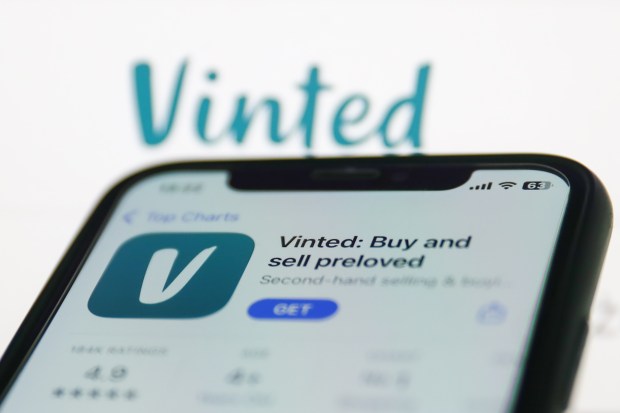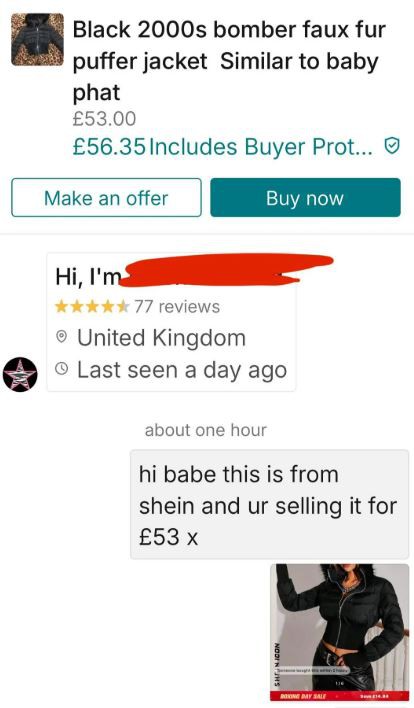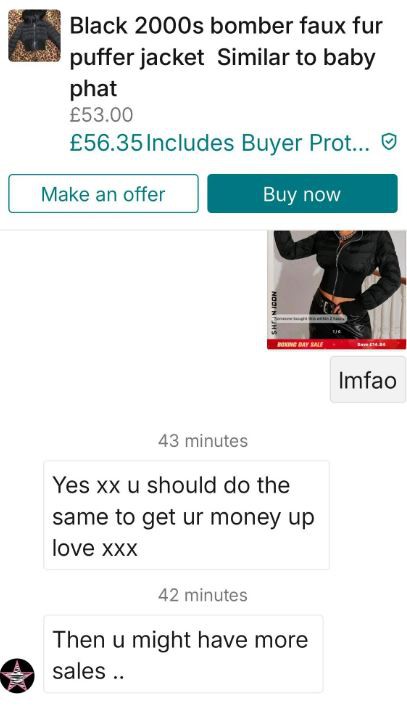A Vinted user recently expressed their disbelief on Reddit over a seller’s questionable profit-making strategy. The user, known as @loz4lifee, came across a listing for a ‘Black 200s bomber faux fur puffer jacket’ which the seller had linked to the iconic 90s brand Baby Phat, with a price tag of £53.
Upon further investigation, the user discovered that the jacket was actually a £32 item from the popular budget retailer Shein. Feeling disheartened by the blatant markup, they decided to confront the seller directly on the Vinted app, stating: “Hi babe, this is from Shein and you’re selling it for £53.”
To the user’s astonishment, the seller replied with a rather cheeky comeback: “Yes, you should do the same to get your money up, love. Then you might have more sales…”
Unfazed by the seller’s attitude, the user shot back: “That’s so bad… cutting the tag off Shein clothes and saying unbranded. Not everyone is here for sales; some people come to buy, if you didn’t already know.”
The seller responded by asserting that they were still making sales, before ultimately blocking the user. Frustrated, the user took to Reddit, sharing their experience in the r/vinted community to raise awareness, stating: “Sellers like this make me want to stop using Vinted. Some innocent unknowing person will buy it having no idea.”
Despite their good intentions, the user received mixed reactions from fellow Redditors, with several suggesting that they were “wasting their time” and comparing the situation to larger clothing brands that inflate prices on inexpensive wholesale items. One user advised, “Just report it,” but the original poster claimed they had already done so, only to be told they were making “false reports.”
Another commenter shared a similar experience, lamenting, “Literally had the exact same situation happen to me. Vinted don’t give a diddly fk about fakes/scams.” A third user added, “You know what the worst part is? I got in touch with Vinted (and also Depop actually) about this issue of people selling items at five times the price from SHEIN and Aliexpress, and their response was basically that it’s not forbidden to sell at a higher price than the original price of the product because people aren’t forced to buy it.”

In response to the initial outrage, another user pointed out a broader issue: “You’re angry at private sellers doing this, but where is the same energy for all the corporations and businesses doing this? This is basically how every business in the world works, and you gladly hand over your money.”
Protection on Vinted

Some resellers defend their practice of listing items at significantly marked-up prices, considering it a legitimate method of “flipping” items for profit. However, Vinted’s policies clearly state that sellers cannot list items they have not purchased for personal use with the intent to resell. The online marketplace emphasizes that ensuring buyer protection while using their site is a top priority.
To enhance security for buyers, Vinted offers Buyer Protection, which allows shoppers to receive a refund if the item is significantly not as described. They also conduct random checks on transactions by prompting purchase verification and maintain a support team available for customer inquiries.
Do you need to pay tax on items sold on Vinted?

- The only instance where an item might be taxable is if it sells for more than £6,000 and there is a profit (i.e., it sells for more than the purchase price). Even in this case, sellers can utilize their capital gains tax-free allowance of £3,000 to offset it.
- Generally, only business sellers who are trading for profit (buying goods with the intent of reselling them at a higher price) might need to pay taxes. Business sellers can benefit from a tax-free allowance of £1,000, which has been in place since 2017.
- For more information, visit: vinted.co.uk/no-changes-to-taxes
How to avoid getting scammed on reselling sites

1. Assess seller’s profiles and reviews
- Look for positive feedback and a history of successful transactions. Pay attention to details such as their profile picture, join date, and any potential red flags.
2. Ask questions
- Don’t hesitate to reach out to sellers with inquiries about the item’s condition, authenticity, or any concerns you may have.
3. Question prices and offers
- If something appears too good to be true, it probably is.
4. Cross-check the data
- Does the item match the description and photo? Compare prices of similar items on the app or other platforms.
5. Report suspicious activity
- If you suspect fraud or a scam, reach out to the app’s support team and report the issue.